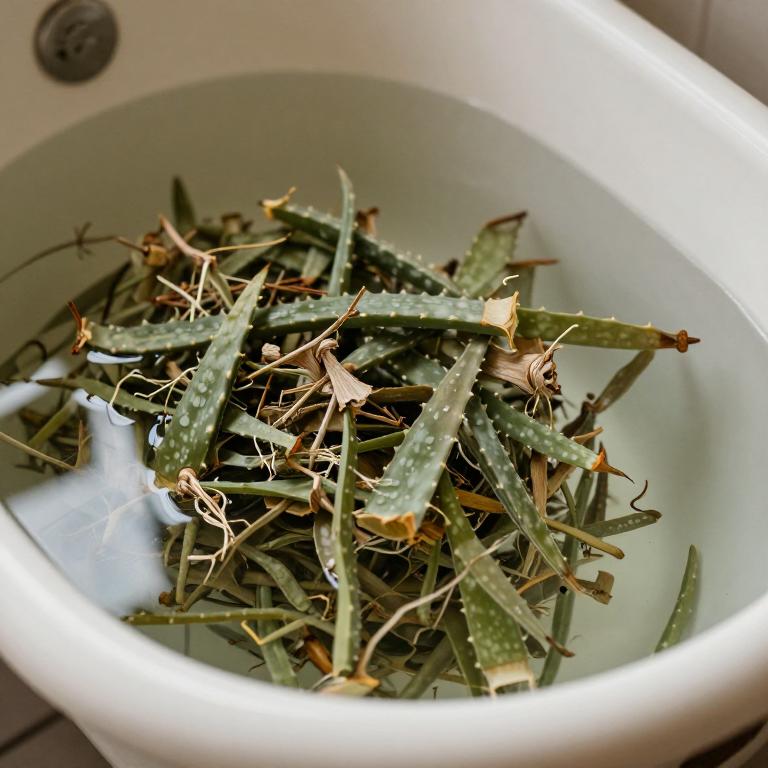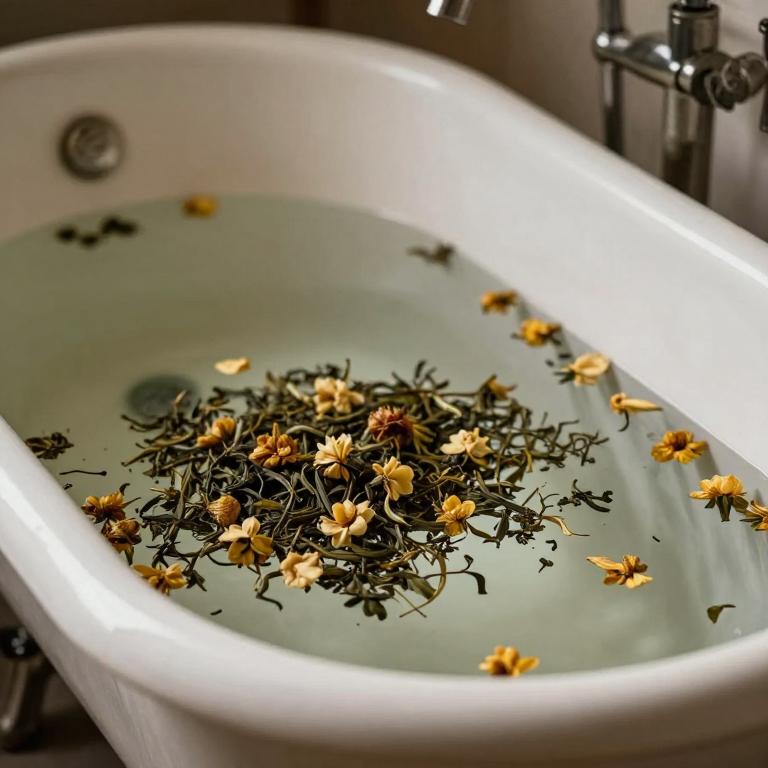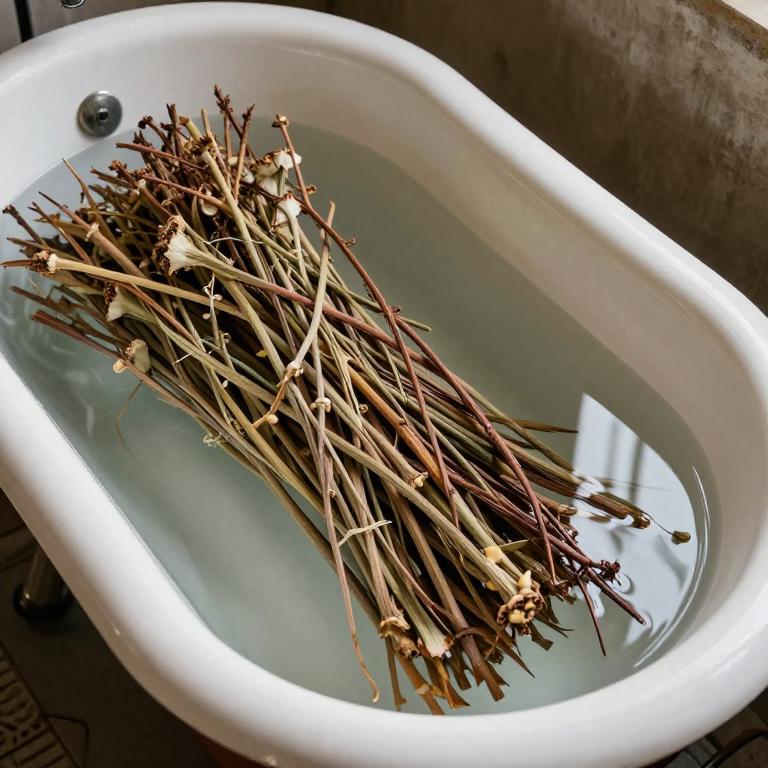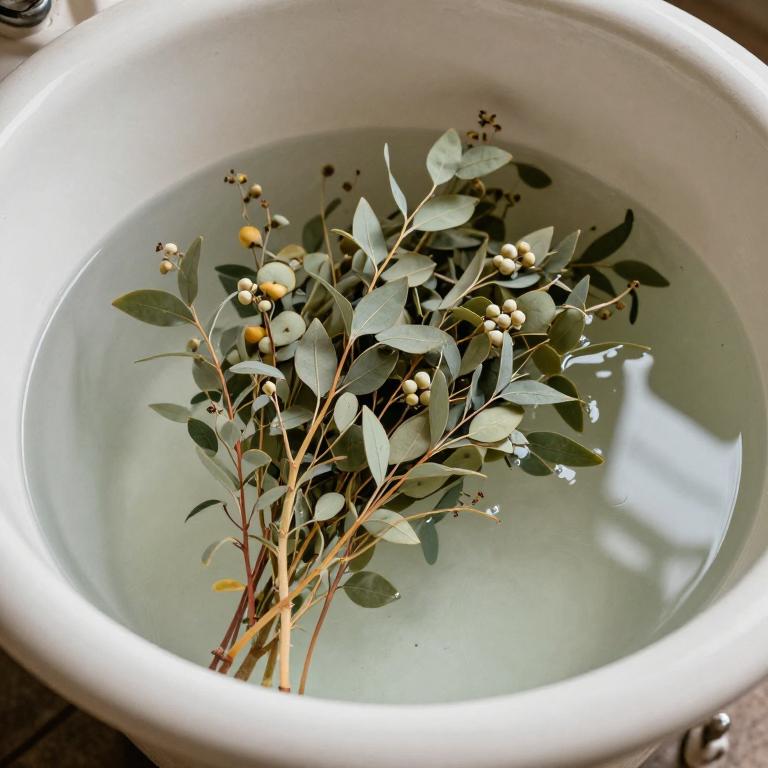10 Best Herbal Baths For Dry Hair

Herbal baths for dry hair involve infusing warm water with natural herbs known for their moisturizing and nourishing properties.
Common herbs used include chamomile, lavender, and rosemary, which can help soothe the scalp and improve hair texture. These baths work by opening the hair cuticles, allowing moisture to penetrate more deeply and restore hydration. To use, simply steep the chosen herbs in hot water, let it cool slightly, and then use it as a rinse after shampooing.
Regular use of herbal baths can promote healthier, softer hair and reduce dryness over time.
Table of Contents
- 1. Rosemary (Rosmarinus officinalis)
- 2. Stinging nettle (Urtica dioica)
- 3. Field horsetail (Equisetum arvense)
- 4. English lavender (Lavandula angustifolia)
- 5. St. john's wort (Hypericum perforatum)
- 6. Aloe vera (Aloe barbadensis)
- 7. Camellia (Camellia sinensis)
- 8. Lemon grass (Cymbopogon citratus)
- 9. Salvia (Salvia officinalis)
- 10. Melaleuca (Melaleuca alternifolia)
1. Rosemary (Rosmarinus officinalis)

Rosmarinus officinalis, commonly known as rosemary, is a versatile herb that has been traditionally used for its aromatic and therapeutic properties.
When incorporated into herbal baths for dry hair, rosemary helps to stimulate scalp circulation, promoting healthier hair growth and improving overall scalp health. The essential oils in rosemary have antifungal and antibacterial properties that can help reduce dandruff and other scalp conditions. A rosemary herbal bath can also nourish and moisturize dry hair by balancing oil production and adding a natural shine.
To use it, simply steep fresh or dried rosemary in hot water, let it cool, and use the infused water as a rinse after shampooing for best results.
2. Stinging nettle (Urtica dioica)

Urtica dioica, commonly known as stinging nettle, is a potent herbal remedy that can be used in baths to nourish and rejuvenate dry hair.
When infused into bath water, stinging nettle provides a rich source of minerals such as iron, calcium, and magnesium, which help strengthen hair follicles and improve scalp health. The antioxidants present in nettle also combat free radicals, reducing damage and promoting healthier hair growth. To use it for dry hair, simply steep fresh or dried nettle leaves in hot water for several hours, then add the infusion to a warm bath and soak for 15 to 20 minutes.
This natural treatment can leave hair feeling softer, smoother, and more hydrated, offering a gentle yet effective alternative to chemical-based hair treatments.
3. Field horsetail (Equisetum arvense)

Equisetum arvense, commonly known as field horsetail, is a potent herb traditionally used in herbal baths for its high silica content, which helps strengthen and restore dry hair.
When infused into bath water, it can deeply nourish the scalp and hair shaft, promoting hydration and improving hair elasticity. The astringent properties of horsetail also help to cleanse the scalp, reducing excess oil and dandruff, making it particularly beneficial for those with dry, brittle hair. Regular use of equisetum arvense baths can enhance hair shine and reduce breakage, offering a natural alternative to chemical treatments.
This ancient remedy is valued for its ability to promote healthy hair growth and overall scalp wellness through its mineral-rich, soothing properties.
4. English lavender (Lavandula angustifolia)

Lavandula angustifolia, commonly known as English lavender, is a popular herb used in herbal baths for its soothing and therapeutic properties.
When added to bath water, lavender essential oil or dried lavender flowers can help nourish and hydrate dry hair by softening the scalp and reducing frizz. The calming aroma of lavender also promotes relaxation, making the bath experience more enjoyable. Regular use of lavender-infused baths can improve overall hair health by balancing moisture levels and reducing itchiness.
This natural remedy is especially beneficial for those with dry, brittle hair seeking a gentle yet effective way to enhance their hair's softness and shine.
5. St. john's wort (Hypericum perforatum)

Hypericum perforatum, commonly known as St. John's Wort, is a herbal remedy that can be used in baths to benefit dry hair by promoting scalp health and enhancing hair texture.
When infused into bathwater, the plant's essential oils and anti-inflammatory properties help soothe the scalp, reduce irritation, and improve circulation, which can stimulate healthier hair growth. The antioxidants present in St. John's Wort may also help protect the hair from environmental damage and strengthen the hair shaft. To use it for dry hair, one can steep dried hypericum perforatum in hot water for several hours, then add the infusion to a warm bath and soak for 15 to 20 minutes.
This natural remedy offers a gentle, soothing way to nourish and moisturize dry hair while promoting a healthy scalp environment.
6. Aloe vera (Aloe barbadensis)

Aloe barbadensis, commonly known as aloe vera, is a natural remedy that can be beneficial for those with dry hair when used in herbal baths.
The gel extracted from the aloe plant contains essential nutrients like vitamins, minerals, and enzymes that help nourish and hydrate the hair shaft. When incorporated into a bath, aloe vera can help soften the hair, reduce frizz, and improve overall hair texture. Its soothing properties also help to calm the scalp, reducing irritation and promoting a healthy environment for hair growth.
Regular use of aloe barbadensis in herbal baths can lead to visibly healthier, more manageable hair over time.
7. Camellia (Camellia sinensis)

Camellia sinensis, commonly known as the tea plant, is the source of green tea and black tea, and its extracts can be beneficial when used in herbal baths for dry hair.
These baths can help nourish and moisturize the hair by providing essential antioxidants and vitamins that promote hair health. The natural anti-inflammatory and antimicrobial properties of camellia sinensis may also help reduce scalp irritation and dandruff, which are common issues for those with dry hair. To use it, you can steep the leaves in hot water, let it cool, and then use the infused water as a rinse after shampooing.
Regular use of camellia sinensis herbal baths can lead to softer, more manageable hair and a healthier scalp.
8. Lemon grass (Cymbopogon citratus)

Cymbopogon citratus, commonly known as lemongrass, is a versatile herb often used in herbal baths to promote hair health, particularly for those with dry hair.
When infused into bath water, lemongrass provides a refreshing scent and gentle exfoliating properties that help remove buildup from the scalp and hair strands. The essential oils in lemongrass have moisturizing effects that can help restore hydration to dry, brittle hair, making it softer and more manageable. Regular use of lemongrass baths can also stimulate blood circulation in the scalp, encouraging healthier hair growth.
This natural remedy is a safe and soothing alternative to commercial hair treatments, offering both therapeutic and aesthetic benefits for dry hair care.
9. Salvia (Salvia officinalis)

Salvia officinalis, commonly known as sage, has been traditionally used in herbal baths to nourish and revitalize dry hair.
When infused into bath water, sage provides a calming and soothing effect, helping to reduce scalp irritation and promote relaxation. Its natural antioxidants and anti-inflammatory properties can help strengthen hair follicles and improve overall hair health. A sage-infused bath can also help to balance oil production and enhance the absorption of other hair treatments.
Regular use of sage herbal baths may lead to softer, more manageable hair and a healthier scalp environment.
10. Melaleuca (Melaleuca alternifolia)

Melaleuca alternifolia, commonly known as tea tree oil, is often used in herbal baths to nourish and hydrate dry hair.
When added to bath water, it helps to soothe the scalp and promote a healthy environment for hair growth. The antifungal and antibacterial properties of tea tree oil can also help reduce scalp irritation and dandruff, which are common in individuals with dry hair. A gentle tea tree oil bath can enhance the overall moisture content of the hair, making it softer and more manageable.
Regular use of this herbal bath can contribute to a healthier scalp and stronger, more lustrous hair.